If you've ever witnessed your cat suddenly sprint out of the litter box like they're competing in the Olympic Games, you're not alone. The phenomenon known as "cat zoomies after pooping" is a curious and often hilarious behavior that leaves many pet owners puzzled and amused.
These unexpected bursts of energy are more than just random antics—they're rooted in complex feline instincts and physiological responses that have evolved over thousands of years. Understanding why cats engage in this behavior can help pet owners better comprehend their furry friend's unique characteristics.
The Science Behind Feline Zoomies
Instinctual Survival Mechanisms
Cats' post-poop zoomies are deeply connected to their wild ancestral survival strategies. In nature, defecation makes animals vulnerable to predators, creating a powerful instinct to quickly leave the area. This evolutionary trait persists in domestic cats, triggering an adrenaline-fueled escape response even in the safety of a home environment.
When a cat uses the litter box, their body releases stress hormones like adrenaline and cortisol. These chemical signals can prompt a sudden, frantic burst of energy—what we commonly call zoomies. It's essentially a leftover survival mechanism designed to help cats quickly distance themselves from potential predators who might track them by waste odor.
Physical and Neurological Triggers
Interestingly, the act of defecation can stimulate the vagus nerve, which runs from the brain through the digestive system. This stimulation can create a sense of euphoria or relief, leading to an energetic response. Some veterinary experts describe this as "poo-phoria"—a moment of physical liberation that manifests as a sudden, explosive run.
When Zoomies Might Signal a Medical Concern
Recognizing Potential Health Issues
While zoomies are typically harmless, sudden changes in this behavior could indicate underlying health problems. Pet owners should be alert to additional symptoms such as:
- Diarrhea or changes in stool consistency
- Blood in urine or stool
- Signs of discomfort during defecation
- Unusual frequency of litter box visits
If your cat develops post-poop zoomies accompanied by these symptoms, consulting a veterinarian is recommended to rule out potential medical issues like urinary tract infections, intestinal inflammation, or other digestive complications.
Managing and Understanding Zoomies
Creating a Comfortable Environment
To help manage your cat's zoomies and ensure their comfort, consider these strategies:
- Maintain a clean litter box
- Provide multiple litter box locations
- Ensure the litter box is in a quiet, accessible area
- Use unscented, soft litter that feels comfortable
Regular play sessions and environmental enrichment can also help cats expend excess energy in more controlled, predictable ways.
Frequently Asked Questions
Why do cats experience sudden energy bursts or 'zoomies' after using the litter box?
Cats get zoomies due to a combination of evolutionary survival instincts, nerve stimulation, and energy release. It's a natural behavior rooted in their ancestral fight-or-flight response.
How can I determine if my cat's post-poop zoomies are due to a medical issue?
Monitor for additional symptoms like changes in stool, discomfort during elimination, or unusual behavior. If zoomies are accompanied by other concerning signs, consult your veterinarian.
What can I do to reduce or manage zoomies behavior in my cat?
Provide regular play sessions, maintain a clean environment, ensure multiple comfortable litter box locations, and create opportunities for mental and physical stimulation.
Is it normal for cats to get the zoomies at specific times of day?
Yes, cats are often more active during dawn and dusk, which can coincide with their natural hunting instincts. These times might trigger more frequent zoomie episodes.
How can I distinguish between playful zoomies and those possibly caused by an unclean litter box or other discomforts?
Observe your cat's overall behavior. Playful zoomies are typically accompanied by relaxed body language, while discomfort-induced zoomies might involve signs of stress or physical tension.






